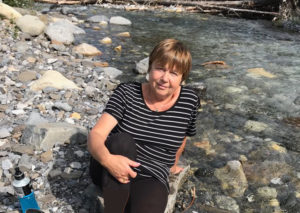Resilience, according to the dictionary definition, is “being able to withstand or recover quickly from difficult conditions”. We need resilience every day to address challenges like raising a family, working at a job, dealing with health problems, and simply to keep on going.
Resilience can also be described as “tending to recover from or adjust easily to misfortune or change”. This definition resonates deeply with me. After immigrating to Canada from Poland, I experienced a major change in my life in encountering an unfamiliar culture. I found many differences between the two cultures; to name just a few: lack of foods I was used to (where was my celery root, delicious buns, and pastries?), a different conception of personal space (why is she backing off when I talk to her?), the way people addressed each other (how dare you call me by my first name?! I hardly know you!), and the smile of a stranger on the street (at that time in Poland only a mentally unstable person would smile at you while passing).
Then came the language and its subtleties, such as “taboo” topics (when I asked a new Canadian friend how much money he made, he was offended), small talk (no offense, but I hate it to this day), and everyday expressions used by everybody that I had to learn to be able to communicate effectively with others.
I also learned that there were different notions about hospitality. For instance, I discovered that an unannounced visit was a ‘faux pas’; and when I was invited over by a new Canadian friend and all she offered me was a glass of water, I had to fight back tears…
Overall, I felt lost in these new experiences. I learned (the hard way) that different cultures have different, sometimes even opposite, behavioral norms; in other words, in this world there is not an absolute right or absolute wrong way of living. The absence of family and friends added to my struggle; I was homesick and in a state of culture shock. And worst of all, even though I had a home, I felt homeless. I lived under the impression that I did not belong to any group, any culture, or even to any physical place anymore! The only times I felt comfortable was when I was gliding in space on an airplane, on my way to visit Poland or coming back to Canada from Poland. I didn’t have to decide in those moments where I belonged or who I really was…
So how did I survive? How did I build the resilience to face these overwhelming circumstances, and accept what was beyond my control? What helped me to keep going despite my state of despair? Resilience shows itself as adaptability. I had to develop the skill of being able to let go of my preconceived notions about peoples’ behaviour – and instead of fighting them, to see the good in them. Also, not knowing what the future would bring (our family faced deportation and we didn’t have jobs or money), I had to learn how to live in the moment and focus on what I could do “right now”. For instance, I swallowed my pride and got a job at Wendy’s, where I started off cleaning toilets before being promoted to working at the salad bar.
When I felt homesick, lonely, and desperate, I tried to remember one of The Three Universal Truths in Buddhist teaching: that “everything is impermanent and changing”. Impermanence can lead to suffering, but it can also show itself as the improvement of circumstances. Knowing that nothing stays the same, I could be more optimistic about the future.
In addition, our family became a part of the local church community that reached out to us. Our new Canadian friends helped us financially by fully equipping our little apartment with donated furniture, appliances, kitchenware, pots and pans, and even toys for our two little girls. They welcomed us into their lives and offered sincere friendship. I will forever be grateful for this community of loving people; without them I wouldn’t have been able to build enough resilience to cope and survive without a major nervous breakdown.
Over time, things gradually changed for the better. My husband got a good job, I enrolled in a diploma program at the University of Calgary, our kids learned English, and we all made new friends. The new culture did not seem so strange anymore and, to my great surprise, we fell in love with Canada!
However, despite having adapted, I still did not feel totally fulfilled. I learned that stabilization is not enough to protect us from feeling lost and empty. Jesus promises us “the abundant life “(John 10:10). To live our lives with purpose and fulfillment we need spiritual resilience.
There are times in our lives when, despite having our needs met, we feel depressed and empty, as if something is missing. When something bad or tragic happens, we may question God’s goodness or even His existence, and He seems to be absent from our lives. Our ideas about who He is collapse. Struggling to deal with these tribulations on our own, we may find ourselves in a spiritual crisis which spreads into other areas of our lives. That’s why in this state of affliction it is good to have someone who can, without judgement, listen to us, mirror our questions and doubts, help us get in touch with our feelings, and – possibly – help us find God in all this confusion. And this is exactly what spiritual direction is about.
We build spiritual resilience by “opening fully to God’s loving Presence, and co-discerning (…) God’s activity in every aspect of life” (Jeff Imbach, the co-founder of SoulStream Ministries). Over the years, it has become clear to me that offering a safe space and a listening ear to those who want to explore these ideas has been my own deep desire…and that’s why I became a spiritual director.
Henri Nouwen defines hospitality in spiritual direction in these words: “Hospitality is not to change people, but to offer them space where change can take place.” Meeting with my own spiritual director for the last two years has resulted in deep healing of my past, and more conscious insights into my present. The sessions help me build up my faith and relationship with God, who is the fundamental and true source of my strength, whether I’m aware of it or not. The “knots” in my relationships with others are being “untied”, and I’m learning to understand the hidden and sometimes ugly but true motives behind my behaviours. I observe the same dynamics in the sessions with my directees, who experience healing through growing awareness of who they are and who God is.
I have also learned to cultivate gratitude – for the people in my life, the experiences I have had, the lessons I have learned, and God’s faithful companionship along the way.









